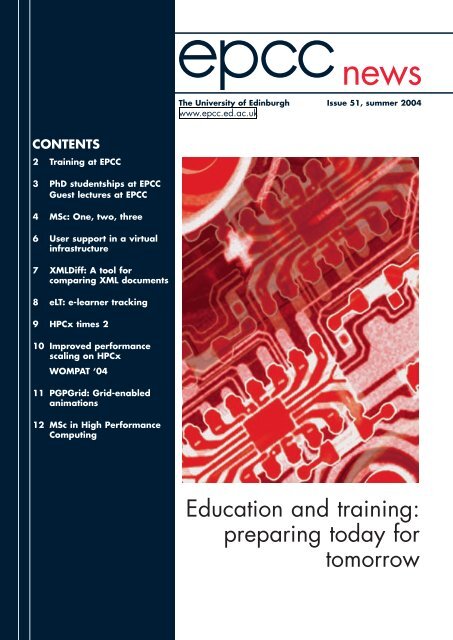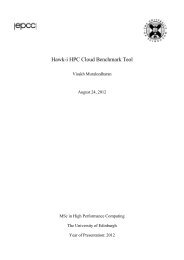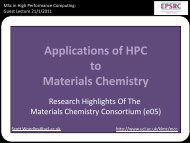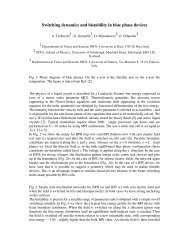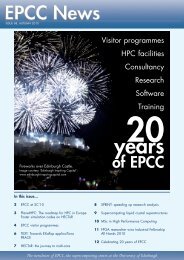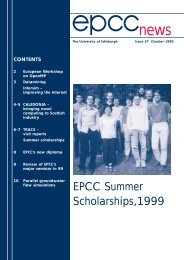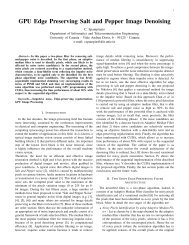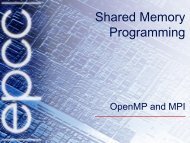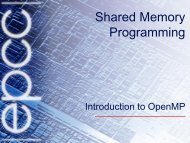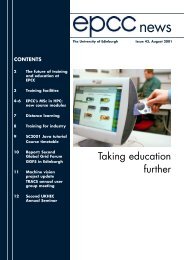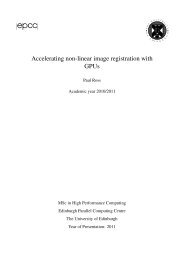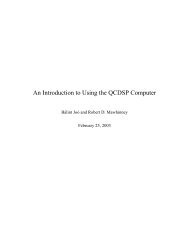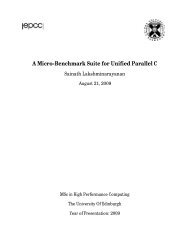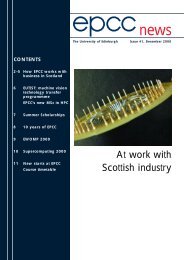Download PDF - EPCC - University of Edinburgh
Download PDF - EPCC - University of Edinburgh
Download PDF - EPCC - University of Edinburgh
You also want an ePaper? Increase the reach of your titles
YUMPU automatically turns print PDFs into web optimized ePapers that Google loves.
news<br />
The <strong>University</strong> <strong>of</strong> <strong>Edinburgh</strong><br />
www.epcc.ed.ac.uk<br />
Issue 51, summer 2004<br />
CONTENTS<br />
2 Training at <strong>EPCC</strong><br />
3 PhD studentships at <strong>EPCC</strong><br />
Guest lectures at <strong>EPCC</strong><br />
4 MSc: One, two, three<br />
6 User support in a virtual<br />
infrastructure<br />
7 XMLDiff: A tool for<br />
comparing XML documents<br />
8 eLT: e-learner tracking<br />
9 HPCx times 2<br />
10 Improved performance<br />
scaling on HPCx<br />
WOMPAT ‘04<br />
11 PGPGrid: Grid-enabled<br />
animations<br />
12 MSc in High Performance<br />
Computing<br />
Education and training:<br />
preparing today for<br />
tomorrow
FOCUS: TRAINING<br />
Editorial<br />
Judy Hardy<br />
This edition <strong>of</strong> <strong>EPCC</strong> News has the theme ‘education<br />
and training’. In recent years we have expanded our<br />
commitment to training the next generation <strong>of</strong> HPC<br />
pr<strong>of</strong>essionals through the MSc in High Performance<br />
Computing. The MSc is now a well-established fixture at<br />
<strong>EPCC</strong>, and we look forward to its continuing expansion<br />
over the coming years. Building on from its success, we<br />
are also very pleased to be able to <strong>of</strong>fer our first PhD<br />
studentships from September 2004. This issue includes<br />
articles on both the MSc and PhD.<br />
From September this year, our MSc courses will run<br />
separately from our long-standing range <strong>of</strong> short training<br />
courses. However, a number <strong>of</strong> intensive courses will<br />
continue to be <strong>of</strong>fered as part <strong>of</strong> the HPCx National<br />
Service, together with a selection <strong>of</strong> courses aimed more<br />
specifically at HPCx users. The latest <strong>of</strong> these is described<br />
in this issue.<br />
e-Learning is now an integral part <strong>of</strong> learning for both<br />
students and researchers. We include articles on two<br />
projects in this area: distributed collaborative learning via<br />
an innovative use <strong>of</strong> Access Grid technology to facilitate<br />
shared ‘surgeries’ between remote sites as part <strong>of</strong> the<br />
HPC Europa programme; and a project to investigate and<br />
understand how students use online resources.<br />
Finally, there are also some articles which give updates<br />
on various other <strong>EPCC</strong> projects. Of particular note is the<br />
recent upgrade to the HPCx National Service. This is now<br />
the most powerful academic supercomputer in Europe with<br />
a performance <strong>of</strong> 6 Tflops.<br />
I hope this edition <strong>of</strong> <strong>EPCC</strong> News gives you an overview<br />
<strong>of</strong> the range <strong>of</strong> training and education activities here at<br />
<strong>EPCC</strong> and that you find the articles both educational and<br />
enjoyable.<br />
Training at<br />
<strong>EPCC</strong> Judy Hardy<br />
<strong>EPCC</strong> is excellently equipped to provide both MSc<br />
students and course attendees with state-<strong>of</strong>-the-art training<br />
facilities. We have a dedicated training room which is<br />
equipped with 26 Sun Ray flat screen terminals together<br />
with a Sun Blade 2000 server. The Sun Rays use smart<br />
card technology, so that once you are logged in you can<br />
pull the smart card out at any time and the session will<br />
reappear when the card is inserted into any <strong>of</strong> the Sun<br />
Rays. Our courses typically comprise a mixture <strong>of</strong> lectures<br />
and practical sessions, and one common use for the smart<br />
cards is to transfer a student session to the trainer’s Sun<br />
Ray and hence to the data projector – so interesting results<br />
from a practical session can be shared with the whole class!<br />
The standard HPC resource available for all courses is the<br />
<strong>University</strong> HPC service ‘lomond’, a Sun Fire E15K server<br />
installed in 2003 (see <strong>EPCC</strong> News 48). This is a single SMP<br />
cluster with 52 UltraSPARC III processors configured<br />
into a 4-processor front end for compilation, debugging<br />
and testing and a 48-processor back end for batch runs.<br />
We also <strong>of</strong>fer a number <strong>of</strong> course for users <strong>of</strong> the HPCx<br />
National Service. The newest <strong>of</strong> these courses, ‘Improved<br />
Performance Scaling on HPCx’, is described on p10.<br />
The <strong>EPCC</strong> Access Grid (AG) node is located next to the<br />
Training Room. The AG node and Training Room are<br />
separated with a removable partition, which gives us the<br />
possibility <strong>of</strong> <strong>of</strong>fering lectures, seminars or even complete<br />
courses to remote users via Access Grid. For example,<br />
the HPC-Europa consortium will use the AG node to run<br />
‘surgeries’ in which visitors from different sites can meet<br />
to discuss common issues; see ‘User support in a Virtual<br />
Infrastructure’ on p6.<br />
Over the last three years, most <strong>of</strong> our courses have been<br />
shared by both MSc students and other course attendees.<br />
As described in ‘MSc: One, Two, Three’ on p4, from<br />
September 2004 our MSc courses will be run in a more<br />
traditional university style <strong>of</strong> weekly lectures and practicals<br />
and so will not generally be available for other HPC users.<br />
However, we will continue to <strong>of</strong>fer a range <strong>of</strong> intensive<br />
short courses for HPC users as part <strong>of</strong> the HPCx service.<br />
For details <strong>of</strong> upcoming courses please see:<br />
<strong>EPCC</strong>: www.epcc.ed.ac.uk/computing/training<br />
HPCx: www.hpcx.ac.uk/support/training<br />
2
FOCUS: TRAINING<br />
PhD studentships at <strong>EPCC</strong> Mark Bull<br />
<strong>EPCC</strong> is planning to build on its successful MSc in High<br />
Performance Computing and expand its postgraduate<br />
programme by taking on PhD students. We expect to take<br />
students starting in the 2004/2005 academic year. Here<br />
are two <strong>of</strong> the potential projects being considered:<br />
Self-optimising applications<br />
For many high-performance applications, considerable<br />
programmer effort is required to tune the application when<br />
it is ported to a new platform. With the likely rise in the<br />
potential number <strong>of</strong> platforms readily available to users via<br />
computational grids or similar resource sharing capabilities,<br />
this task will become increasingly onerous.<br />
The essential concept for this project is to determine to<br />
what extent this process could be automated. Applications<br />
can be equipped with switches (either run-time or compile<br />
time) and tunable parameters which affect performance.<br />
The process <strong>of</strong> tuning the code is therefore largely one<br />
<strong>of</strong> finding the optimal settings. If the programmer can<br />
identify the key factors affecting performance and equip<br />
the application in a suitable way, then an automatic system<br />
can search for the best values.<br />
However, the search spaces can <strong>of</strong>ten be large and their<br />
behaviour highly non-linear. Smart search techniques will<br />
be needed for effective automatic tuning. Some promising<br />
approaches from the field <strong>of</strong> adaptive compilation exploit<br />
machine learning techniques, and this project will<br />
investigate their use at the application level.<br />
High performance computing and lattice gases<br />
Lattice gases provide a very flexible computational<br />
approach to the study <strong>of</strong> the physics <strong>of</strong> complex solid/<br />
fluid mixtures and are becoming increasingly important in<br />
materials research. They also have the advantage that they<br />
are highly amenable to parallel computation.<br />
This project will investigate the introduction <strong>of</strong> accurate<br />
solid-fluid boundary conditions into a lattice Boltzmann<br />
model which has been developed at <strong>EPCC</strong>. This issue is<br />
important in the effective and efficient representation <strong>of</strong><br />
solid particles suspended in fluid, which is an active area<br />
<strong>of</strong> current research.<br />
Further information<br />
www.epcc.ed.ac.uk/computing/training/PhD<br />
Guest lectures at <strong>EPCC</strong> Daragh Byrne<br />
As part <strong>of</strong> the MSc in High<br />
Performance Computing run<br />
at <strong>EPCC</strong>, a number <strong>of</strong> people<br />
are invited to give a guest<br />
lecture. These are open to all<br />
staff and students. The lecture<br />
topics are diverse, with<br />
topics including cosmological<br />
modelling, genetic analysis<br />
and web services. This year’s<br />
lecture series included:<br />
• Alistair Law, Director <strong>of</strong> Vision Consulting Scotland,<br />
who described the management <strong>of</strong> a 400-person team<br />
developing the infrastructure for an internet bank, stressing<br />
the need for people-orientated project management.<br />
• Paul Burton from the <strong>University</strong> <strong>of</strong> Reading described<br />
the work <strong>of</strong> the Met. Office in embracing HPC, focusing<br />
in particular on recent work using the HPCx machine.<br />
• Andrew Herbert, director <strong>of</strong> Micros<strong>of</strong>t Research UK,<br />
reviewed the history <strong>of</strong> distributed computing from basic<br />
remote procedure calls to web services, using concepts<br />
from economics to predict future evolutions in the field.<br />
• Chris Thomas <strong>of</strong> IBM discussed how all forms <strong>of</strong><br />
computing are applied to topics as diverse as gene<br />
sequencing and recording the results <strong>of</strong> drug trials.<br />
• Cronan McNamara <strong>of</strong> Trinity Centre for High<br />
Performance Computing at Trinity College, Dublin, talked<br />
about the MonteCarlo project, which developed high<br />
performance s<strong>of</strong>tware for modelling the intake <strong>of</strong> certain<br />
chemicals by humans via food.<br />
All in all a fascinating year, and we look forward to the<br />
next.<br />
If you would like to contribute, please email brief details <strong>of</strong> a<br />
proposed talk to: d.byrne@epcc.ed.ac.uk<br />
3
FOCUS: TRAINING<br />
MSc: One, two, three David<br />
Henty<br />
We are now in the third year <strong>of</strong> the MSc in HPC, and<br />
our successful students are just embarking on their MSc<br />
dissertations having completed the taught part <strong>of</strong> the<br />
programme. This year, the taught part comprised the<br />
following ten courses:<br />
• Fundamental Concepts <strong>of</strong> High Performance Computing<br />
• Practical S<strong>of</strong>tware Development<br />
• Shared Memory Programming<br />
• Message Passing Programming<br />
• Parallel Decomposition<br />
• Core Topics in HPC and e-Science<br />
• Object Oriented Programming for HPC<br />
• Exploiting the Computational Grid<br />
• Applied Numerical Algorithms<br />
• Hardware, Compilers and Performance Programming<br />
Almost all <strong>of</strong> these were also available externally via our<br />
training programme. As well as attending the courses,<br />
MSc students had to complete substantial pieces <strong>of</strong><br />
coursework (one for each course) amounting to 50% <strong>of</strong><br />
the marks, with the remaining 50% coming from written<br />
examinations.<br />
MSc dissertations<br />
The dissertation is an extremely important (and hopefully<br />
enjoyable!) part <strong>of</strong> the MSc, and one where we hope<br />
that students especially benefit from <strong>EPCC</strong>’s working<br />
environment with its diverse mix <strong>of</strong> research and s<strong>of</strong>tware<br />
development projects in HPC and e-Science. To give<br />
a flavour <strong>of</strong> the kind <strong>of</strong> work going on, here are brief<br />
summaries <strong>of</strong> three <strong>of</strong> the projects currently underway.<br />
OpenMP Runtime Library<br />
Performance<br />
Supervisor: Mark Bull<br />
Student: Paul Walsh<br />
This project will<br />
examine the performance <strong>of</strong> some key operations which<br />
typically form a key part <strong>of</strong> an implementation <strong>of</strong> the<br />
OpenMP runtime library.<br />
A number <strong>of</strong> algorithms for implementing tree-based<br />
lock free barriers have been published in the research<br />
literature. However, there have been few recent<br />
studies on their comparative performance on the latest<br />
shared-memory architectures. Part <strong>of</strong> this project will<br />
implement a number <strong>of</strong> barrier algorithms and test their<br />
performance on Sun 15K and IBM p690+ platforms.<br />
The dissertations for all the projects will be available on<br />
the MSc webpage from October this year.<br />
The future <strong>of</strong> the MSc<br />
The MSc is now a well established part <strong>of</strong> <strong>EPCC</strong>’s<br />
activities, and we are pleased to announce that we have<br />
recently secured long-term funding from the <strong>University</strong> <strong>of</strong><br />
<strong>Edinburgh</strong>’s School <strong>of</strong> Physics to continue the programme<br />
after our initial EPSRC grant expires. As part <strong>of</strong> a general<br />
reorganisation <strong>of</strong> course structure at <strong>Edinburgh</strong>, which<br />
includes a move to a two-semester rather than three-term<br />
academic year, we will also be significantly changing the<br />
way that courses are <strong>of</strong>fered. From September 2004, our<br />
MSc courses will be <strong>of</strong>fered in a more traditional ‘longthin’<br />
style rather than the current delivery method <strong>of</strong><br />
intensive, three-day blocks. Each course will occupy a<br />
single morning or afternoon slot every week, and will last<br />
for a whole semester. There will also be two new courses:<br />
‘Scientific Visualisation’ and ‘Advanced Topics in HPC and<br />
e-Science’.<br />
This reorganisation, coupled with an expected increase in<br />
student numbers, means that we will no longer be able<br />
to accommodate external attendees on these courses.<br />
However, many <strong>of</strong> the core HPC courses will still be<br />
<strong>of</strong>fered as part <strong>of</strong> the National HPCx Supercomputer<br />
Service.<br />
MSc home page: www.epcc.ed.ac.uk/msc<br />
<strong>EPCC</strong> training programme:<br />
www.epcc.ed.ac.uk/computing/training/courses<br />
HPCx courses: www.hpcx.ac.uk/support/training<br />
Since both these architectures are mildly NUMA, one<br />
interesting question is whether it is worth trying to<br />
map the tree structure <strong>of</strong> the barrier to the underlying<br />
architecture. Many barrier algorithms require threads to<br />
spin on a global flag which is then toggled by one thread<br />
when all other threads are known to have arrived at the<br />
barrier. However, other mechanisms are possible, and<br />
may perform better on these machines.<br />
A second important operation in the OpenMP runtime is<br />
array reduction. There are a number <strong>of</strong> possible ways to<br />
implement this, and their relative performance depends<br />
on the size <strong>of</strong> the array and the number <strong>of</strong> threads. In<br />
this project we will investigate these different methods<br />
and try to determine which method is most appropriate<br />
in a range <strong>of</strong> different circumstances.<br />
4
FOCUS: TRAINING<br />
Domain Decomposition for Colloid Clusters<br />
Supervisor: Kevin Stratford<br />
Student: Pedro Gomez<br />
It is possible to represent small solid particles, known as<br />
colloids, in a numerical model <strong>of</strong> fluid flow (the ‘lattice<br />
Boltzmann’ method). The particles move around freely<br />
in the fluid and can bounce <strong>of</strong>f each other according to<br />
Newton’s Laws. Particles that approach each other more<br />
closely than a certain critical distance are said to form<br />
clusters. Clusters <strong>of</strong> many particles can arise, forming<br />
complex aggregates in three dimensions. Numerically,<br />
the clusters must be treated as a single object at certain<br />
stages <strong>of</strong> the calculation.<br />
Parallelisation with domain decomposition then presents<br />
a problem: each sub-domain contains a number <strong>of</strong><br />
particles locally, but a large cluster <strong>of</strong> many particles<br />
might span two or more sub-domains. Information about<br />
all the particles must then be available across the subdomains.<br />
Developing a Client Toolkit for Data Services<br />
Supervisors: Ally Hume and Amy Krause<br />
Student: Craig Munro<br />
Web services provide a language-neutral and<br />
machine-independent means <strong>of</strong> machine-to-machine<br />
communication using XML-based technologies. Over<br />
the last few years they have been increasingly used in<br />
the commercial world to support business-to-business<br />
relationships. Within roughly the same time frame,<br />
Grid Computing has adopted web services as a basis<br />
for linking and sharing large scale computing and data<br />
resources. Web service protocols have been extended<br />
slightly to address scientific based problems. Of late an<br />
attempt is being made to reconcile these two slightly<br />
disparate views.<br />
The OGSA-DAI project aims to develop middleware<br />
that will allow data resources – currently mainly<br />
database systems – to be accessed and integrated into a<br />
Grid environment. This allows both science and business<br />
applications to publish and access data using the same<br />
language-neutral and machine-independent methods as<br />
are used in web and Grid services.<br />
The aim <strong>of</strong> this project is to design and create a ‘toy’<br />
model which represents particles in a three-dimensional<br />
box subject to a regular decomposition. Then:<br />
• particles close together must be identified as belonging<br />
to the same cluster<br />
• information about all the particles in large clusters that<br />
span sub-domains must be distributed to the appropriate<br />
processes<br />
• this procedure must be repeated as the particles move<br />
around. The data structures and communication patterns<br />
required to do this effectively and efficiently must be<br />
identified.<br />
They<br />
all<br />
lived<br />
happily<br />
ever<br />
GlobusWorld 2004 - www.ogsadai.org.uk<br />
after<br />
Use OGSA-DAI to provide the middleware<br />
tools to grid-enable existing databases<br />
access<br />
transformation<br />
discovery<br />
collaboration<br />
integration<br />
This MSc project will design and implement a new<br />
Client Toolkit API in Perl or C, drawing on the<br />
existing Java implementation. This will allow legacy<br />
HPC and scientific applications to utilise OGSA-DAI<br />
services.<br />
The project will require good s<strong>of</strong>tware engineering<br />
principles and good design as the transfer <strong>of</strong> data<br />
using the Client Toolkit must be efficient in order to<br />
be usable. In particular, care must be taken to avoid<br />
copying <strong>of</strong> data wherever possible.<br />
1<br />
5
FOCUS: TRAINING<br />
User support in a virtual<br />
infrastructure J-C Desplat and Catherine Inglis<br />
The HPC-Europa consortium (presented in <strong>EPCC</strong> News<br />
50) aims to integrate the provision <strong>of</strong> HPC services<br />
to the European research community in an innovative<br />
and coherent manner. HPC-Europa consists <strong>of</strong> several<br />
interrelated projects, at the core <strong>of</strong> which lies the<br />
transnational access visitor programme 1 . This will allow<br />
some 800 researchers based in the EU and Associated<br />
States to visit one <strong>of</strong> the many universities and<br />
research institutes associated with the six HPC centres<br />
participating in the visitor programme. The combination<br />
<strong>of</strong> the stimulating intellectual environment provided by<br />
the host research department, the technical expertise <strong>of</strong><br />
the staff at the HPC centres and access to some <strong>of</strong> the<br />
most powerful HPC systems in the world allows visitors<br />
to explore new avenues and make significant advances in<br />
their research.<br />
Over the next four years, our consortium will explore<br />
a novel approach using Access Grid (AG) technology<br />
to bring together the complementary expertise <strong>of</strong> staff<br />
across the six centres in order to provide a higher<br />
standard <strong>of</strong> user support to visiting researchers. This<br />
approach also meets one <strong>of</strong> the European Commission’s<br />
key objectives: to achieve a long-term structuring effect<br />
on both users <strong>of</strong> our facilities and the operators <strong>of</strong> our<br />
large-scale infrastructures.<br />
One strength <strong>of</strong> the previous visitor programme was the<br />
successful fostering <strong>of</strong> a spirit <strong>of</strong> collaboration between<br />
local research communities and European visitors. Now<br />
HPC-Europa aims to extend this co-operative spirit<br />
across the consortium as a whole. This is key to the<br />
success <strong>of</strong> the project as it will lead to the emergence<br />
<strong>of</strong> virtual communities <strong>of</strong> researchers and facilitate crossdisciplinary<br />
fertilisation.<br />
Surgery sessions via Access Grid<br />
The concept <strong>of</strong> distributed user support over the Grid<br />
is currently a hot topic <strong>of</strong> conversation. Although<br />
we do not plan to ‘distribute’ user support over the<br />
consortium per se (each centre remains responsible for<br />
its own systems), we can certainly exploit economies<br />
<strong>of</strong> scale and synergies across the consortium. One easy<br />
way to do this is by setting up joint ‘surgery sessions’<br />
(group tutorials) across two or more HPC centres via<br />
AG. For these surgery sessions, an expert at one <strong>of</strong><br />
the centres will be asked to prepare a short tutorial on<br />
an appropriate topic eg MPI, OpenMP or some other<br />
specific aspect <strong>of</strong> HPC. Visitors will be informed a few<br />
days in advance and will be able to send questions to the<br />
expert or suggest topics for discussion. This will help<br />
the expert draw up an agenda for the meeting based<br />
on the questions and topics most frequently raised. The<br />
meeting itself will take place via AG across all interested<br />
HPC-Europa centres. Exploiting AG technology in this<br />
way will provide the following benefits:<br />
• local expertise can be shared with all visitors at<br />
participating centres: eg if specific expertise only exists<br />
at certain centres then HPC-Europa visitors – and even<br />
staff – at any centre will have the opportunity to benefit<br />
from this knowledge<br />
• economy <strong>of</strong> scale: participating centres will take it in<br />
turns to provide experts for common topics such as, say,<br />
MPI or OpenMP<br />
• educational benefits: surgeries will allow our visitors to<br />
meet other researchers tackling similar problems to their<br />
own. By removing technical problems from the context<br />
<strong>of</strong> the specific application area, a multidisciplinary<br />
audience can come to realise that they have more in<br />
common than they might have assumed. We hope that<br />
the visitors will continue to interact after the workshop<br />
has taken place<br />
• structuring effect on the infrastructures: events <strong>of</strong> this<br />
type will allow the HPC-Europa centres to combine<br />
their skills to long-lasting and practical effect (one <strong>of</strong><br />
the key objectives <strong>of</strong> the European Commission’s 6th<br />
Framework Programme)<br />
• promote best practice by example: by raising<br />
researchers’ awareness <strong>of</strong> the potential benefits to their<br />
working practices <strong>of</strong> new technology such as AG, we<br />
aim to facilitate collaborations across geographicallydispersed<br />
research groups.<br />
Continued opposite<br />
6
FOCUS: TRAINING<br />
XMLDiff: a tool for<br />
comparing XML documents<br />
George Beckett, Matthew Egbert, Linsday Pottage and Craig McNeile<br />
XMLDiff is a small but powerful application that enables<br />
scientists to compare and validate numerical data rapidly<br />
and effectively.<br />
The project was motivated by the needs <strong>of</strong> the UKQCD<br />
Collaboration. One <strong>of</strong> their key activities is to develop<br />
a repository <strong>of</strong> numerical experiments, which consume<br />
significant amounts <strong>of</strong> computational power and generate<br />
large volumes <strong>of</strong> numerical data (in the form <strong>of</strong> XML<br />
documents). These experiments are constantly being<br />
extended to take advantage <strong>of</strong> a growing understanding <strong>of</strong><br />
the underlying physics and to exploit innovations in HPC<br />
technology.<br />
When an experiment is modified, it is fundamental that<br />
UKQCD can confirm the continued correctness <strong>of</strong> the<br />
supporting numerical code. This is done by validating the<br />
numerical data generated against reference results sets.<br />
Until now, this comparison has been done in one <strong>of</strong> two<br />
ways:<br />
• Visual inspection <strong>of</strong> the output datasets, which is a<br />
simple though time-consuming and error-prone approach.<br />
• Script-based comparison, which provides some level <strong>of</strong><br />
automation but cannot easily be generalised to multiple<br />
experiments.<br />
Neither <strong>of</strong> these approaches is particularly satisfactory.<br />
Thus <strong>EPCC</strong>, in collaboration with UKQCD, has developed<br />
an application (XMLDiff) that can quickly and reliably<br />
complete the comparison <strong>of</strong> experimental data without the<br />
need for manual intervention.<br />
To use XMLDiff, a scientist creates a description <strong>of</strong> the<br />
semantics <strong>of</strong> a dataset, capturing this information in a<br />
simple and compact form called a metric. With this<br />
metric, XMLDiff can validate any dataset that conforms<br />
to the metric specification, highlighting discrepancies or<br />
failures. The information produced by XMLDiff facilitates<br />
rapid diagnosis <strong>of</strong> problems in the numerical code.<br />
XMLDiff is supported by PPARC.<br />
For more information or to download the s<strong>of</strong>tware, see:<br />
http://forge.nesc.ac.uk/projects/xmldiff/<br />
Workshops and seminars via Access Grid<br />
In addition to existing workshops and seminars run locally<br />
(eg <strong>EPCC</strong> MSc guest lectures or NeSC events), we intend<br />
to hold half-day seminars quarterly across our consortium<br />
using AG technology. We will invite a researcher <strong>of</strong><br />
international reputation to chair these events, to ensure<br />
high attendance and active participation from HPC-Europa<br />
visitors and local research communities. With a minimum<br />
<strong>of</strong> two HPC-Europa sites taking part in each <strong>of</strong> these<br />
events, these seminars have the potential to achieve many<br />
<strong>of</strong> the benefits <strong>of</strong> ordinary seminars for a fraction <strong>of</strong> the<br />
cost. In doing this, we can demonstrate to researchers<br />
– including both our local research community and visitors<br />
– how new Grid-based technology <strong>of</strong>fers them an effective<br />
means to collaborate remotely with other research groups.<br />
To encourage better integration into their host department,<br />
HPC-Europa visitors are actively encouraged to give<br />
a presentation <strong>of</strong> their work. However, should there<br />
be enough interest within the distributed HPC-Europa<br />
community, we would propose that the host department<br />
relocate their talk to HPC-Europa’s AG facilities to enable<br />
visitors at all centres to participate. These AG-based<br />
workshops and seminars have the potential to make a<br />
considerable impact on Europe’s research communities, yet<br />
the costs involved and effort required are modest.<br />
The HPC-Europa project represents a unique opportunity<br />
to establish our partnership as the world-leading<br />
consortium in HPC and pioneer the spirit <strong>of</strong> what<br />
constitutes a global infrastructure (where the value <strong>of</strong><br />
the ‘infrastructure’ is based on its users rather than just<br />
hardware).<br />
Further information<br />
www.hpc-europa.org<br />
See also the related article on distance learning at:<br />
www.enacts.org<br />
References<br />
1. CEPBA (Barcelona), CINECA (Bologna), <strong>EPCC</strong> (<strong>Edinburgh</strong>), HLRS<br />
(Stuttgart), IDRIS (Paris), SARA (Amsterdam).<br />
7
FOCUS: TRAINING<br />
eLT:<br />
e-learner tracking<br />
Judy Hardy<br />
e-Learning is becoming an increasingly important vehicle<br />
to enhance a student’s learning experience. It is important<br />
– but <strong>of</strong>ten hard – to evaluate the effectiveness <strong>of</strong> the<br />
e- learning strategy underpinning the design and delivery <strong>of</strong><br />
an online component <strong>of</strong> a course. Detailed understanding<br />
<strong>of</strong> the way that students interact with online course<br />
resources can help inform this process, and can be used<br />
as a basis for future development and refinement <strong>of</strong> the<br />
course. The e-learner tracking (eLT) project aims to<br />
analyse the way that students use e-learning resources and<br />
to relate the findings to the guiding principles used in the<br />
course design.<br />
At present there are almost 5,000 <strong>University</strong> <strong>of</strong> <strong>Edinburgh</strong><br />
courses with a presence in the <strong>University</strong>-wide virtual<br />
learning environment WebCT – although many <strong>of</strong> these<br />
may not be active – with a total <strong>of</strong> over 10,000 individual<br />
files. This project will examine the activities <strong>of</strong> students on<br />
a large mainstream Physics course ‘Foundations <strong>of</strong> Physics’.<br />
This course has a long-established WebCT presence, and<br />
contains almost 50% <strong>of</strong> the total content stored within<br />
WebCT at the <strong>University</strong> <strong>of</strong> <strong>Edinburgh</strong>.<br />
The work builds on a small-scale trial that has already been<br />
completed. The results <strong>of</strong> that work were very encouraging<br />
and provided partial answers to generic questions such as:<br />
• How do students actually utilise e-learning materials<br />
• Does this change as the course progresses<br />
• Do students perceptions <strong>of</strong> what they believe is valuable<br />
and useful map onto those <strong>of</strong> the course authors and<br />
teachers<br />
• Do what students perceive to be more challenging<br />
aspects <strong>of</strong> the course material receive more or less<br />
attention in an e-learning environment<br />
• Is there any mapping between students’ use <strong>of</strong> online<br />
material and their ability (eg as evidenced by their course<br />
marks)<br />
The eLT project is developing a set <strong>of</strong> stand-alone tools<br />
that track, analyse and display students’ use <strong>of</strong> online<br />
material. These will be tailored to work within WebCT.<br />
Our aim is to present views <strong>of</strong> the data that can be<br />
understood in terms <strong>of</strong> the overall course design. To do<br />
this, views are constructed that correspond to the logical<br />
structure <strong>of</strong> the course eg into chapters, sections etc.<br />
rather than the way that it has been decomposed into html<br />
files.<br />
The tracking mechanisms already available within WebCT,<br />
or even datamining the web server logs, only provide a<br />
restricted view <strong>of</strong> what is required and will not log all<br />
<strong>of</strong> the features used within ‘Foundations <strong>of</strong> Physics’ such<br />
as pop-up windows and in-line panels activated through<br />
JavaScript and DHTML.<br />
The tracking tools could in principle be applied to<br />
other courses packaged within WebCT. We expect the<br />
lessons learned and experience gained in the analysis and<br />
interpretation <strong>of</strong> this type <strong>of</strong> data for large student cohorts<br />
using a complex e-learning package to be applicable to a<br />
wide range <strong>of</strong> e-learning courses across the <strong>University</strong>.<br />
This project is a collaboration between <strong>EPCC</strong> and the<br />
School <strong>of</strong> Physics. It is funded under the <strong>University</strong><br />
e- learning Project Fund.<br />
For more information and to investigate the prototype tools see:<br />
www.epcc.ed.ac.uk/projects/elt/<br />
Or contact the project team at: elt@epcc.ed.ac.uk<br />
8
FOCUS: TRAINING<br />
HPCx<br />
times 2<br />
Alan Simpson and John Fisher<br />
160000<br />
120000<br />
80000<br />
Available<br />
Used<br />
Usage during upgrade<br />
40000<br />
0<br />
1-Apr 1-May 1-Jun<br />
HPCx, the UK’s national capability computing service, has<br />
doubled its performance to more than 6 Tflops by moving<br />
to the second phase <strong>of</strong> its development. This makes it<br />
once again the most powerful academic computing system<br />
in Europe. The new platform has now been accepted as<br />
fully operational by EPSRC.<br />
The word upgrade is not really an adequate description<br />
<strong>of</strong> this move. In effect, the second phase platform is an<br />
entirely new system. The 40 IBM Regatta frames have<br />
been replaced with 50 Regatta H+ frames, giving us<br />
1600 1.7 MHz Power 4+ processors. The communication<br />
interconnect between the frames has been replaced by the<br />
new High Performance Switch technology and disk space<br />
has doubled.<br />
This was a long and extremely complex operation,<br />
probably the major technical challenge <strong>of</strong> the whole HPCx<br />
project. A plan was agreed between EPSRC and HPCx<br />
which minimised downtime and disruption to users over<br />
the period <strong>of</strong> the change. For example, in April, when<br />
the first part <strong>of</strong> the change was made, the processor time<br />
available to users was reduced by less than 10%. In May,<br />
although for a time the number <strong>of</strong> frames in use had to<br />
be reduced to 20, we nonetheless delivered to users more<br />
processing time units than in any previous month.<br />
We can follow the stages in the changeover on the diagram<br />
above. The first frames were installed in the computer<br />
room while the old service was still running, and by 31<br />
March there were 20 <strong>of</strong> them, containing 640 processors.<br />
On that date we started an early-use service, during which<br />
a number <strong>of</strong> users tried out the system and provided useful<br />
feedback, especially about the new documentation. On 26<br />
April, the old service was closed. During the next three<br />
days, there was a break while the service was transferred<br />
to the new platform – all the projects and user accounts<br />
and the entire file store, nearly 2.5 million files – and<br />
the system was configured for general use. Corresponding<br />
changes were made to the HPCx database and its s<strong>of</strong>tware.<br />
The new service opened to all users on 29 April with 20<br />
frames. During May extra frames were added using normal<br />
maintenance sessions. There was another break in service<br />
on May 26 and 27 for testing and benchmarking, and the<br />
complete platform opened with 50 frames on 28 May.<br />
As can be seen from the diagram, the breaks in service<br />
were quite short. It is also interesting to note how closely<br />
utilisation follows the changes in the available resource.<br />
(The dip at the end <strong>of</strong> May resulted from a problem in<br />
the external network.)<br />
All this was achieved without any significant problems<br />
by close co-operation between Mike Brown, the HPCx<br />
systems group and the IBM technical team. We also need<br />
to thank the users <strong>of</strong> HPCx for their co-operation and<br />
forbearance.<br />
Benchmark trials on the new platform indicate that the<br />
performance <strong>of</strong> real jobs has more than doubled, with<br />
a particular improvement for those jobs which did not<br />
scale very well on the first phase interconnect. We can<br />
now routinely run jobs using 1280 processors. It is clear<br />
that this event represents a really significant increase in<br />
the capability resource available to UK researchers, and<br />
an opportunity to attack problems which up to now have<br />
been out <strong>of</strong> reach.<br />
The second upgrade to HPCx will double its performance<br />
yet again. This will be complete by the end <strong>of</strong> 2006, and<br />
planning is already well under way.<br />
The <strong>University</strong> <strong>of</strong> <strong>Edinburgh</strong>, through <strong>EPCC</strong>, is the lead<br />
contractor for the HPCx service, working with CLRC Daresbury<br />
Laboratory and IBM.<br />
More information: www.hpcx.ac.uk<br />
9
FOCUS: TRAINING<br />
Workshop: OpenMP Applications and Tools (WOMPAT ‘04)<br />
Mark Bull<br />
WOMPAT is one <strong>of</strong> three<br />
annual workshops organised by<br />
cOMPunity, the community<br />
<strong>of</strong> OpenMP researchers and<br />
developers. Since its release<br />
in 1997, OpenMP has gained<br />
popularity and strong industry support as a de facto<br />
standard for programming shared memory parallel<br />
computers. WOMPAT is the US workshop, held this year<br />
at the <strong>University</strong> <strong>of</strong> Houston, Texas. The other workshops<br />
are EWOMP (Europe) and WOMPEI (Asia/Pacific).<br />
I was invited to attend WOMPAT this year to give a<br />
presentation on the work <strong>of</strong> the language committee <strong>of</strong><br />
the OpenMP ARB, <strong>of</strong> which I am currently the chair. The<br />
committee is producing a new version <strong>of</strong> the OpenMP<br />
language specification, merging the Fortran and C/C++<br />
specifications, and resolving inconsistencies between them.<br />
A number <strong>of</strong> other committee members were there, some<br />
<strong>of</strong> whom I had never seen in person, despite speaking to<br />
them every week during phone conferences!<br />
The first two days <strong>of</strong> the workshop consisted <strong>of</strong> submitted<br />
papers and invited talks. Some <strong>of</strong> the highlights were:<br />
• An announcement <strong>of</strong> a trial product from Intel,<br />
supporting OpenMP on Linux clusters via a virtual shared<br />
memory system.<br />
• A session on autoscoping, which tries to combine the<br />
power <strong>of</strong> autoparallelising compilers with the portability <strong>of</strong><br />
OpenMP.<br />
• An invited talk by John Gustafson on the problem <strong>of</strong><br />
heat in future architectures.<br />
• Benchmark results from large shared memory systems<br />
such as the Sun Fire 25K and SGI Altix.<br />
The last two days <strong>of</strong> the workshop consisted <strong>of</strong> practical<br />
lab sessions, where compilers and analysis tools from both<br />
academia and industry were presented and made available<br />
for workshop attendees to try out.<br />
Participating vendors included Fujitsu, HP, IBM, Intel,<br />
ParaWise and Sun. Other compilers and tools were<br />
Dragon/Open64, Omni and TAU.<br />
For further details see:<br />
WOMPAT 04: www.tlc2.uh.edu/wompat2004<br />
OpenMP: www.openmp.org<br />
cOMPunity: www.compunity.org<br />
Improved performance scaling on HPCx<br />
Lorna Smith<br />
<strong>EPCC</strong> has <strong>of</strong>fered a wide range <strong>of</strong> training courses to<br />
HPC users in the UK and Europe over many years.<br />
The latest in this series <strong>of</strong> courses is the ‘Improved<br />
Performance Scaling on HPCx’ course. Aimed primarily<br />
at users <strong>of</strong> the HPCx National Service, the course is<br />
also applicable to users with an interest in constellation<br />
systems.<br />
Constellation systems, or clustered symmetric<br />
multiprocessing (SMP) systems, have gradually become<br />
more prominent in the HPC market, with many <strong>of</strong> the<br />
top supercomputing systems now being based on this<br />
type <strong>of</strong> architecture. For example, in addition to HPCx,<br />
<strong>of</strong> the top three systems in the world, two are based on<br />
clustered SMP architectures (The Earth Simulator and<br />
ASCI Q, see www.top500.org).<br />
As these systems have become more prominent, it has<br />
become essential for applications to scale effectively<br />
on this type <strong>of</strong> architecture. On HPCx, we have<br />
found that for some applications to achieve effective<br />
scaling, it has been necessary to consider the underlying<br />
clustered nature <strong>of</strong> the HPCx architecture. For example,<br />
many codes have benefited from a cluster-aware<br />
implementation <strong>of</strong> MPI collective routines.<br />
The aim <strong>of</strong> this course is to introduce the tools and<br />
techniques required to achieve optimal performance and<br />
scaling on HPCx, and more generally on constellation<br />
systems. We cover techniques for optimising interand<br />
intra-node communication, such as overlapping<br />
communication, cluster-aware message passing, mixed<br />
mode programming and processor mapping. Tools for<br />
pr<strong>of</strong>iling communication patterns are also covered, as<br />
are a range <strong>of</strong> additional topics, such as effective IO and<br />
memory usage.<br />
If you are interested in attending this course, please see the<br />
HPCx website:<br />
www.hpcx.ac.uk/support/training/HPCxScale.html<br />
10
FOCUS: TRAINING<br />
PGPGrid:<br />
Grid-enabled<br />
animations<br />
Kostas Kavoussanakis<br />
PGPGrid aims to use the computational power <strong>of</strong> the Grid<br />
to enable the production <strong>of</strong> realistic, computer-generated<br />
animations (CGAs). This project is a collaboration between<br />
<strong>EPCC</strong>, Peppers Ghost Productions Limited (PGP) and 3D-<br />
Matic Laboratory at The <strong>University</strong> <strong>of</strong> Glasgow. (See issue<br />
49 <strong>of</strong> <strong>EPCC</strong> News for the initial announcement.) PGPGrid<br />
addresses three areas <strong>of</strong> CGAs:<br />
• the capture <strong>of</strong> human-actor sequences <strong>of</strong> images on 3D-<br />
Matic’s capture rig and conformance <strong>of</strong> their features to<br />
those <strong>of</strong> PGP’s animation characters<br />
• the Grid-enabled extraction <strong>of</strong> 3D information from a<br />
series <strong>of</strong> 2D images into 3D models (stereo-correlation)<br />
• the Grid-enabled rendering <strong>of</strong> the 3D models to generate<br />
animation sequences. On a different level, we also<br />
investigate the formation <strong>of</strong> Virtual Organisations (VOs) in<br />
the animation industry.<br />
3D-Matic are currently developing the production<br />
workflow that will enable them to produce cost effective,<br />
high quality animation from captured sequences. The<br />
problem most recently addressed was noise in the 3D<br />
models: the solution is to smooth the trajectory <strong>of</strong> each<br />
individual point over time, using a high-frequency filter.<br />
With respect to stereo-correlation, 3D-Matic have<br />
developed JPie, a Java API based on Milner’s Pi-Calculus 1 .<br />
This satisfies the requirement <strong>of</strong> our application to spawn<br />
processes rapidly and dynamically for solving a subset <strong>of</strong><br />
the problem. A first prototype <strong>of</strong> JPie is now complete.<br />
<strong>EPCC</strong> is working on a web services-based, JPie resource<br />
locator. This allows JPie servers to register their availability<br />
with a central locator entity, which is queried by clients<br />
wanting to spawn a JPie process on appropriate servers.<br />
In order to allow Grid-enabled rendering, <strong>EPCC</strong> is<br />
working with PGP on the specification <strong>of</strong> a suitable<br />
environment. Our aim is to demonstrate seamless<br />
rendering and transfer <strong>of</strong> data from the animator to<br />
a distributed render farm and back, within a Grid<br />
environment. <strong>EPCC</strong> has released the first version <strong>of</strong><br />
the Virtual Organisation Report 2 . This draws on the<br />
experiences <strong>of</strong> animation and other IT VOs to propose<br />
a series <strong>of</strong> recommendations adopted by the PGPGrid<br />
VO. These will be complemented with experiences and<br />
recommendations for animation-producing VOs later in the<br />
project.<br />
PGPGrid will participate in the 2004 e-Science AllHands<br />
meeting in Nottingham with a demonstrator, a paper and a<br />
poster covering all angles <strong>of</strong> the project. We look forward<br />
to seeing you there.<br />
PGPGrid is funded under the Grid Core Programme <strong>of</strong> the<br />
DTI.<br />
For a selection <strong>of</strong> demos and papers, please visit our project<br />
website: www.epcc.ed.ac.uk/pgpgrid/<br />
References<br />
1. ‘Communicating and mobile systems: the pi calculus’, Robin<br />
Milner, ISBN 052164320, Cambridge <strong>University</strong> Press<br />
2. ‘PGPGrid Virtual Organisation Report’, Ali Anjomshoaa:<br />
www.epcc.ed.ac.uk/pgpgrid/WP1/PGPGrid-VO-Report.pdf<br />
11
FOCUS: TRAINING<br />
MSc in High Performance Computing<br />
<strong>EPCC</strong>, a technology transfer centre within the <strong>University</strong><br />
<strong>of</strong> <strong>Edinburgh</strong>, <strong>of</strong>fers a one-year Masters course in High<br />
Performance Computing (HPC). A number <strong>of</strong> EPSRC<br />
studentships are available, which cover the full fees for<br />
EU residents. UK residents also qualify for a maintenance<br />
grant.<br />
<strong>EPCC</strong> has an international reputation in the application<br />
<strong>of</strong> novel computing solutions to real-life problems. It is<br />
the lead contractor for the HPCx National Service, which<br />
provides the largest academic supercomputing resource in<br />
Europe for the UK research community. This postgraduate<br />
qualification, awarded by the <strong>University</strong> <strong>of</strong> <strong>Edinburgh</strong>,<br />
has a strong practical focus. It is <strong>of</strong> particular appeal<br />
to students who have a keen interest in programming<br />
and in HPC research and applications, but also covers<br />
topics relevant to a wide spectrum <strong>of</strong> careers including<br />
computational science research and commercial s<strong>of</strong>tware<br />
development.<br />
MSc students will have access to an impressive range<br />
<strong>of</strong> leading-edge parallel supercomputers and HPC<br />
technologies, including the HPCx national supercomputer.<br />
Graduates <strong>of</strong> this course will hold one <strong>of</strong> the few<br />
university accredited postgraduate HPC qualifications in<br />
Europe.<br />
The entrance requirement is a good honours degree or<br />
equivalent work experience. No prior HPC knowledge is<br />
assumed, but candidates must be competent in Java, C++,<br />
C or Fortran.<br />
The MSc runs annually, starting each September, and can<br />
be studied full or part-time. The taught part comprises a<br />
series <strong>of</strong> courses, with associated tutorials, course work<br />
and examinations. Students also submit a dissertation based<br />
on 16-weeks independent research work.<br />
Applications are encouraged from science, engineering,<br />
computer science and mathematic graduates who have<br />
prior programming experience, and from those currently<br />
working in a relevant field.<br />
Taught Courses<br />
• Fundamental Concepts <strong>of</strong> HPC<br />
• Practical S<strong>of</strong>tware Development<br />
• Shared Memory Programming<br />
• Message Passing Programming<br />
• Parallel Decomposition<br />
• Core Topics in HPC and e-Science<br />
• Object Oriented Programming for HPC<br />
• Hardware, Compilers and Performance<br />
Programming<br />
• Applied Numerical Algorithms<br />
• Exploiting the Computational Grid<br />
• Scientific Visualisation<br />
• Advanced Topics in HPC and e-Science<br />
For more information and application details see:<br />
www.epcc.ed.ac.uk/msc/<br />
Or email: msc@epcc.ed.ac.uk<br />
This MSc is supported by:<br />
12<br />
www.epcc.ed.ac.uk/msc/


